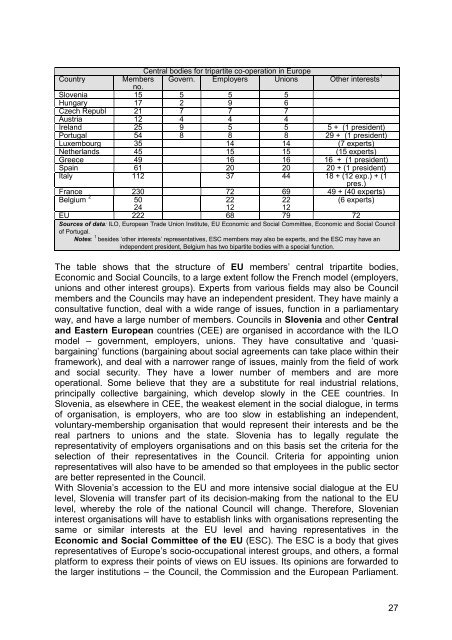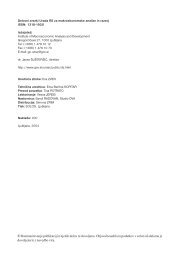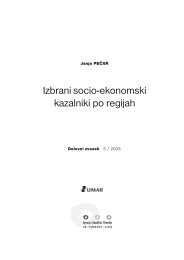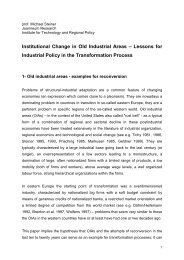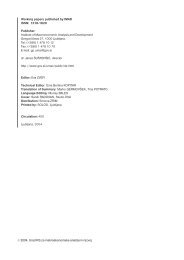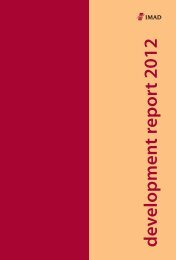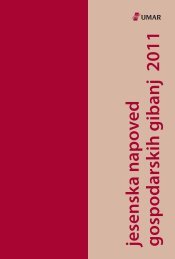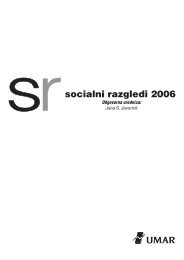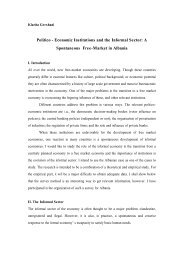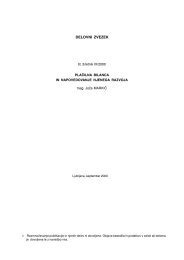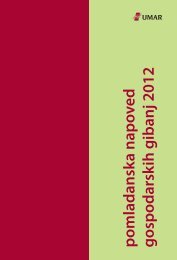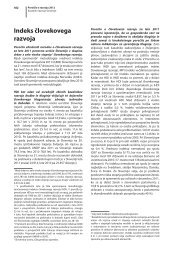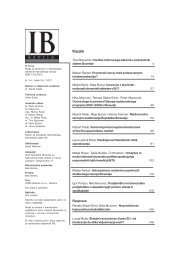The Development of New Industrial Relations in Slovenia - UMAR
The Development of New Industrial Relations in Slovenia - UMAR
The Development of New Industrial Relations in Slovenia - UMAR
Create successful ePaper yourself
Turn your PDF publications into a flip-book with our unique Google optimized e-Paper software.
Central bodies for tripartite co-operation <strong>in</strong> Europe<br />
Country Members Govern. Employers Unions Other <strong>in</strong>terests 1<br />
no.<br />
<strong>Slovenia</strong> 15 5 5 5<br />
Hungary 17 2 9 6<br />
Czech Republ 21 7 7 7<br />
Austria 12 4 4 4<br />
Ireland 25 9 5 5 5 + (1 president)<br />
Portugal 54 8 8 8 29 + (1 president)<br />
Luxembourg 35 14 14 (7 experts)<br />
Netherlands 45 15 15 (15 experts)<br />
Greece 49 16 16 16 + (1 president)<br />
Spa<strong>in</strong> 61 20 20 20 + (1 president)<br />
Italy 112 37 44 18 + (12 exp.) + (1<br />
pres.)<br />
France 230 72 69 49 + (40 experts)<br />
Belgium 2 50<br />
22<br />
22<br />
(6 experts)<br />
24<br />
12<br />
12<br />
EU 222 68 79 72<br />
Sources <strong>of</strong> data: ILO, European Trade Union Institute, EU Economic and Social Committee, Economic and Social Council<br />
<strong>of</strong> Portugal.<br />
Notes: 1 besides ‘other <strong>in</strong>terests’ representatives, ESC members may also be experts, and the ESC may have an<br />
<strong>in</strong>dependent president, Belgium has two bipartite bodies with a special function.<br />
<strong>The</strong> table shows that the structure <strong>of</strong> EU members’ central tripartite bodies,<br />
Economic and Social Councils, to a large extent follow the French model (employers,<br />
unions and other <strong>in</strong>terest groups). Experts from various fields may also be Council<br />
members and the Councils may have an <strong>in</strong>dependent president. <strong>The</strong>y have ma<strong>in</strong>ly a<br />
consultative function, deal with a wide range <strong>of</strong> issues, function <strong>in</strong> a parliamentary<br />
way, and have a large number <strong>of</strong> members. Councils <strong>in</strong> <strong>Slovenia</strong> and other Central<br />
and Eastern European countries (CEE) are organised <strong>in</strong> accordance with the ILO<br />
model – government, employers, unions. <strong>The</strong>y have consultative and ‘quasibarga<strong>in</strong><strong>in</strong>g’<br />
functions (barga<strong>in</strong><strong>in</strong>g about social agreements can take place with<strong>in</strong> their<br />
framework), and deal with a narrower range <strong>of</strong> issues, ma<strong>in</strong>ly from the field <strong>of</strong> work<br />
and social security. <strong>The</strong>y have a lower number <strong>of</strong> members and are more<br />
operational. Some believe that they are a substitute for real <strong>in</strong>dustrial relations,<br />
pr<strong>in</strong>cipally collective barga<strong>in</strong><strong>in</strong>g, which develop slowly <strong>in</strong> the CEE countries. In<br />
<strong>Slovenia</strong>, as elsewhere <strong>in</strong> CEE, the weakest element <strong>in</strong> the social dialogue, <strong>in</strong> terms<br />
<strong>of</strong> organisation, is employers, who are too slow <strong>in</strong> establish<strong>in</strong>g an <strong>in</strong>dependent,<br />
voluntary-membership organisation that would represent their <strong>in</strong>terests and be the<br />
real partners to unions and the state. <strong>Slovenia</strong> has to legally regulate the<br />
representativity <strong>of</strong> employers organisations and on this basis set the criteria for the<br />
selection <strong>of</strong> their representatives <strong>in</strong> the Council. Criteria for appo<strong>in</strong>t<strong>in</strong>g union<br />
representatives will also have to be amended so that employees <strong>in</strong> the public sector<br />
are better represented <strong>in</strong> the Council.<br />
With <strong>Slovenia</strong>’s accession to the EU and more <strong>in</strong>tensive social dialogue at the EU<br />
level, <strong>Slovenia</strong> will transfer part <strong>of</strong> its decision-mak<strong>in</strong>g from the national to the EU<br />
level, whereby the role <strong>of</strong> the national Council will change. <strong>The</strong>refore, <strong>Slovenia</strong>n<br />
<strong>in</strong>terest organisations will have to establish l<strong>in</strong>ks with organisations represent<strong>in</strong>g the<br />
same or similar <strong>in</strong>terests at the EU level and hav<strong>in</strong>g representatives <strong>in</strong> the<br />
Economic and Social Committee <strong>of</strong> the EU (ESC). <strong>The</strong> ESC is a body that gives<br />
representatives <strong>of</strong> Europe’s socio-occupational <strong>in</strong>terest groups, and others, a formal<br />
platform to express their po<strong>in</strong>ts <strong>of</strong> views on EU issues. Its op<strong>in</strong>ions are forwarded to<br />
the larger <strong>in</strong>stitutions – the Council, the Commission and the European Parliament.<br />
27


